*NURSING > EXAM PROCTORED > ATI MENTAL HEALTH PROCTORED EXAM-RETAKE GUIDE (All)
ATI MENTAL HEALTH PROCTORED EXAM-RETAKE GUIDE
Document Content and Description Below
A charge nurse is discussing mental status exams with a newly licensed nurse. Which of the following statements by the newly licensed nurse indicates an understanding of the teaching? (Select all that... apply) A. "To assess cognitive ability, I should ask the client to count backward by sevens." B. "To assess affect, I should observe the client's facial expression." C. "To assess language ability, I should instruct the client to write a sentence." D. "To assess remote memory, I should have the client repeat a list of objects." E. "To assess the client's abstract thinking, I should ask the client to identify our most recent presidents." A nurse is planning care for a client who has a mental health disorder. Which of the following actions should the nurse include as a psychobiological intervention? A. Assist the client with systematic desensitization therapy. B. Teach the client appropriate coping mechanisms. C. Assess the client for comorbid health conditions. D. Monitor the client for adverse effects of the medications. A nurse in an outpatient mental health clinic is preparing to conduct an initial client interview. When conducting the interview, which of the following actions should the nurse identify as the priority? A. Coordinate holistic care with social services. B. Identify the client's perception of her mental health status. C. Include the client's family in the interview. D. Teach the client about her current mental health disorder. A nurse is told during change of shift report that a client is stuporous. When assessing the client, which of the following findings should the nurse expect? A. The client arouses briefly in response to a sternal rub. B. The client has a glasgow coma scale score less than 7. C. The client exhibits decorticate rigidity. D. The client is alert but disoriented to time and place. A nurse is planning a peer group discussion about the DSM-5. Which of the following information is appropriate to include in the discussion? (Select all that apply) A. The DSM-5 includes client education handouts for mental health disorders. B. The DSM-5 establishes diagnostic criteria for individual mental health disorders. C. The DSM-5 indicates recommended pharmacological treatment for mental health disorders. D. The DSM-5 assists nurses in planning care for client's who have mental health disorders. E. The DSM-5 indicates expected assessment findings of mental health disorders. A nurse in an emergency mental health facility is caring for a group of clients. The nurse should identify that which of the following clients requires a temporary emergency admission? A. A client who has schizophrenia with delusions of grandeur B. A client who has manifestations of depression and attempted suicide a year ago C. A client who has borderline personality disorder and assaulted a homeless man with a metal rod D. A client who has bipolar disorder and paces quickly around the room while talking to himself A nurse decides to put a client who has a psychotic disorder in seclusion overnight because the unit is very short-staffed, and the client frequently fights with other clients. The nurse's actions are an example of which of the following torts? A. Invasion of privacy B. False imprisonment C. Assault D. Battery A client tells a nurse, "Don't tell anyone but I hid a sharp knife under my mattress in order to protect myself from my roommate, who is always yelling at me and threatening me." Which of the following actions should the nurse take? A. Keep the client's communication confidential, but talk to the client daily, using therapeutic communication to convince him to admit to hiding the knife. B. Keep the client's communication confidential, but watch the client and his roommate closely. C. Tell the client that this must be reported to the health care team because it concerns the health and safety of the client and others. D. Report the incident to the health care team, but do not inform the client of the intention to do so. A nurse is caring for a client who is in mechanical restraints. Which of the following statements should the nurse include in the documentation? (Select all that apply) A. "Client ate most of his breakfast." B. "Client was offered 8 oz of water every hr." C. "Client shouted obscenities at assistive personnel." D. "Client received chlorpromazine 15 mg by mouth at 1000." E. "Client acted out after lunch." A nurse hears a newly licensed nurse discussing a client's hallucinations in the hallway with another nurse. Which of the following actions should the nurse take first? A. Notify the nurse manager. B. Tell the nurse to stop discussing the behavior. C. Provide an in-service program about confidentiality. D. Complete an incident report. A nurse is caring for the parents of a child who has demonstrated changes in behavior and mood. When the mother of the child asks the nurse for reassurance about her son's condition, which of the following responses should the nurse make? A. "I think your son is getting better. What have you noticed." B. "I'm sure everything will be okay. It just takes time to heal." C. "I'm not sure whats wrong. Have you asked the doctor about your concerns?" D. "I understand you're concerned. Let's discuss what concerns you specifically." A nurse is caring for a client who smokes and has lung cancer. The client reports, "I'm coughing because I have that cold that everyone has been getting." The nurse should identify that the client is using which of the following defense mechanisms? A. Reaction formation B. Denial C. Displacement D. Sublimation A nurse is providing preoperative teaching for a client who was just informed that she requires emergency surgery. The client has a respiratory rate 30/min and says, "This is difficult to comprehend. I feel shaky and nervous." The nurse should identify that the client is experiencing which of the following levels of anxiety? A. Mild B. Moderate C. Severe D. Panic A nurse is caring for a client who is experiencing moderate anxiety. Which of the following actions should the nurse take when trying to give necessary information to the client? (Select all that apply.) A. Reassure the client that everything will be okay. B. Discuss prior use of coping mechanisms with the client. C. Ignore the client's anxiety so that she will not be embarrassed. D. Demonstrate a calm manner while using simple and clear directions. E. Gather information from the client using closed-ended questions. A nurse is talking with a client who is at risk for suicide following the death of his spouse. Which of the following statements should the nurse make? A. "I feel very sorry for the loneliness you must be experiencing." B. "Suicide is not the appropriate way to cope with loss." C. "Losing someone close to you must be very upsetting." D. "I know how difficult it is to lose a loved one." A charge nurse is discussing the characteristics of a nurse-client relationship with a newly licensed nurse. Which of the following characteristics should the nurse include in the discussion? (Select all that apply) A. The needs of both participants are met. B. An emotional commitment exists between the participants. C. It is goal-directed. D. Behavioral change is encouraged. E. A termination date is established. A nurse is in the working phase of a therapeutic relationship with a client who has methamphetamine use disorder. Which of the following actions indicates transference behavior? A. The client asks the nurse whether she will go out to dinner with him. B. The client accuses the nurses of telling him what to do just like his ex-girlfriend. C. The client reminds the nurse of a friend who died from a substance overdose. D. The client becomes angry and threatens to harm himself. A nurse is planning care for the termination phase of a nurse-client relationship. Which of the following actions should the nurse include in the plan of care? A. Discussing ways to use new behaviors B. Practicing new problem-solving skills C. Developing goals D. Establishing boundaries A nurse is orienting a new client to a mental health unit. When explaining the unit's community meetings, which of the following statements should the nurse make? A. "You and a group of other clients will meet to discuss your treatment plans." B. "Community meetings have a specific agenda that is established by staff." C. "You and the other clients will meet with staff to discuss common problems." D. "Community meetings are an excellent opportunity to explore your personal mental health issues." A nurse is caring several clients who are attending community-based mental health programs. Which of the following clients should the nurse plan to visit first? A. A client who recently burned her arm while using a hot iron at home. B. A client who requests that her antipsychotic medication be changed due to some new adverse effects. C. A client who says he is hearing a voice that tells him he is not worth living anymore. D. A client who tells the nurse he experienced manifestations of severe anxiety before and during a job interview. A community mental health nurse is planning care to address the issue of depression among older adult clients in the community. Which of the following interventions should the nurse plan as a method of tertiary prevention? A. Educating clients on health promotion techniques to reduce the risk of depression B. Performing screenings for depression at community health programs C. Establishing rehabilitation programs to decrease the effects of depression D. Providing support groups for clients at risk for depression A nurse is working in a community mental health facility. Which of the following services does this type of program provide? (Select all that apply) A. Educational groups B. Medication dispensing programs C. Individual counseling programs D. Detoxification programs E. Family therapy A nurse in an acute mental health facility is assisting with discharge planning for a client who has a severe mental illness and requires supervision much of the time. The client's wife works all day but is home by late afternoon. Which of the following strategies should the nurse suggest as appropriate follow-up care? A. Receiving daily care from a home health aide B. Having a weekly visit from a nurse case worker C. Attending a partial hospitalization program D. Visiting a community mental health center on a daily basis A nurse is caring for a group of clients. Which of the following clients should a nurse consider for referral to an assertive community treatment (ACT) group? A. A client in an cute care mental health facility who has fallen several times while running down the hallway B. A client who lives at home and keeps "forgetting" to come in for his monthly antipsychotic injection for schizophrenia C. A client in a day treatment program who says he is becoming more anxious during group therapy D. A client in a weekly grief support group who says she still misses her deceased husband who has been dead for 3 months A nurse is teaching a client who has an anxiety disorder and is scheduled to begin classical psychoanalysis. Which of the following client statements indicates an understanding of this form of therapy? A. "Even if my anxiety improves, I will need to continue this therapy for 6 weeks." B. "The therapist will focus on my past relationships during our sessions." C. "Psychoanalysis will help me reduce my anxiety by changing my behaviors." D. "This therapy will address my conscious feelings about stressful experiences." A nurse is discussing free association as a therapeutic tool with a client who has major depressive disorder. Which of the following client statements indicates understanding of this technique? A. "I will write down my dreams as soon as I wake up." B. "I may begin to associate my therapist with important people in my life." C. "I can learn to express myself in a nonaggressive manner." D. "I should say the first thing that comes to my mind." A nurse is preparing to implement cognitive reframing techniques for a client who has an anxiety disorder. Which of the following techniques should the nurse include in the plan of care? (Select all that apply) A. Priority restructuring B. Monitoring thoughts C. Diaphragmatic breathing D. Journal keeping E. Meditation A nurse is caring for a client who has a new prescription for disulfiram for treatment of alcohol use disorder. The nurse informs the client that this medication can cause nausea and vomiting if he drinks alcohol. Which of the following types of treatment is this method an example? A. Aversion therapy B. Flooding C. Biofeedback D. Dialectical behavior therapy A nurse is assisting with systematic desensitization for a client who has an extreme fear of elevators. Which of the following actions should the nurse implement with this form of therapy? A. Demonstrate riding in an elevator, and then ask the client to imitate the behavior. B. Advise the client to say "stop" out loud every time he begins to feel an anxiety response related to an elevator. C. Gradually expose the client to an elevator while practicing relaxation techniques. D. Stay with the client in an elevator until his anxiety response diminishes. A nurse wants to use democratic leadership with a group whose purpose is to learn appropriate conflict resolution techniques. The nurse is correct in implementing this form of group leadership when she demonstrates which of the following actions? A. Observes group techniques without interfering with the group process B. Discusses a technique and then directs members to practice the technique C. Asks for group suggestions of techniques and then support discussion D. Suggests techniques and asks group members to reflect on their use C. Democratic leadership supports group interaction and decision making to solve problems. A nurse is planning group therapy for clients dealing with bereavement. Which of the following activities should the nurse include in the initial phase? (Select all that apply) A. Encourage the group to work toward goals B. Define the purpose of the group C. Discuss termination of the group D. Identify informal roles of members within the group E. Establish an expectation of confidentiality within the group A nurse working on an acute mental health unit forms a group to focus on self- management of medications. At each of meetings, two of the members use the opportunity to discuss their common interest in gambling on sports. This is an example of which of the following concepts? A. Triangulation B. Group process C. Subgroup D. Hidden agenda A nurse is conducting a family therapy session. The adolescent son tells the nurse that he plans ways to make his sister look bad so his parents will think he's the better sibling, which he believes will give him more privileges. The nurse should identify this dysfunctional behavior as which of the following? A. Placation B. Manipulation C. Blaming D. Distraction A nurse is working with an established group and identifies various member roles. Which of the following should the nurse identify as an individual role? A. A member who praises input from other members B. A member who follows the direction of other members C. A member who brags about accomplishments D. A member who evaluates the group's performance toward a standard A nurse is preparing to provide an educational seminar on stress to other nursing staff. Which of the following information should the nurse include in the discussion? A. Excessive stressors cause the client to experience distress. B. The body's initial adaptive response to stress is denial. C. Absence of stressors results in homeostasis. D. Negative, rather than positive, stressors produce a biological response. A nurse is discussing acute vs prolonged stress with a client. Which of the following effects should the nurse identify as an acute stress response? (Select all that apply) A. Chronic pain B. Depressed immune system C. Increased blood pressure D. Panic attacks E. Unhappiness A nurse is teaching a client about stress-reduction techniques. Which of the following client statements indicates understanding of the teaching? A. "Cognitive reframing will help me change my irrational thoughts to something positive." B. "Progressive muscle relaxation uses a mechanical device to help me gain control over my pulse rate." C. "Biofeedback causes my body to release endorphins so that I feel less stress and anxiety." D. "Mindfulness allows me to prioritize the stressors that I have in my life so that I have less anxiety." A client says she is experiencing increased stress because her significant other is "pressuring me and my kids to go live with him. I love him, but I'm not ready to do that." Which of the following recommendations should the nurse make to promote a change in the client's situation? A. Learn to practice mindfulness B. Use assertiveness techniques C. Exercise regularly D. Rely on the support of a close friend A nurse is caring for a client who states, "I'm so stressed at work because of my coworker. He expects me to finish his work because he's too lazy!" When discussing effective communication, which of the following statements by the client to his coworker indicates client understanding? A. "You really should complete your own work. I don't think it's right to expect me to complete your responsibilities." B. "Why do you expect me to finish your work? You must realize that I have my own responsibilities." C. "It is not fair to expect me to complete your work. If you continue, then I will report your behavior to our supervisor." D. "When I have to pick up extra work, I feel very overwhelmed. I need to focus on my own responsibilities." A nurse is providing teaching for a client who is scheduled to receive ECT for the treatment of major depressive disorder. Which of the following client statements indicates understanding of the teaching? A. "It is common to treat depression with ECT before trying medications." B. "I can have my depression cured if I receive a series of ECT treatments." C. "I should receive ECT once a week for 6 weeks." D. "I will receive a muscle relaxant to protect me from injury during ECT." A charge nurse is discussing TMS with a newly licensed nurse. Which of the following statements by the newly licensed nurse indicates an understanding of the teaching? A. "TMS is indicated for clients who have schizophrenia spectrum disorders." B. "I will provide postanesthesia care following TMS." C. "TMS treatments usually last 5-10 minutes." D. "I will schedule the client for daily TMS treatments for the first several weeks." A nurse is assessing a client immediately following an ECT procedure. Which of the following findings should the nurse expect? (Select all that apply) A. Hypotension B. Paralytic ileus C. Memory loss D. Nausea E. Confusion A nurse is leading a peer group discussion about the indications for ECT. Which of the following indications should the nurse include in the discussion? A. Borderline personality disorder B. Acute withdrawal related to a substance use disorder C. Bipolar disorder with rapid cycling D. Dysphoric disorder A nurse is planning care for a client following surgical implantation of a VNS device. The nurse should plan to monitor for which of the following adverse effects? (Select all that apply) A. Voice changes B. Seizure activity C. Disorientation D. Dysphagia E. Neck pain A nurse observes a client who has OCD repeatedly applying, removing, and then reapplying makeup. The nurse identifies that repetitive behavior in a client who has OCD is due to which of the following underlying reasons? A. Narcissistic behavior B. Fear of rejection from staff C. Attempt to reduce anxiety D. Adverse effect of antidepressant medication A nurse is caring for a client who is experiencing a panic attack. Which of the following actions should the nurse take? A. Discuss new relaxation techniques B. Show the client how to change his behavior C. Distract the client with a television show D. Stay with the client and remain quiet A nurse is assessing a client who has generalized anxiety disorder. Which of the following findings should the nurse expect? (Select all that apply) A. Excessive worry for 6 months B. Impulsive decision making C. Delayed reflexes D. Restlessness E. Need for reassurance A nurse is caring for a client who has body dysmorphic disorder. Which of the following actions should the nurse plan to take first? A. Assessing the client's risk for self harm B. Instilling hope for positive outcomes C. Encouraging the client to participate in group therapy sessions D. Encouraging the client to participate in treatment decisions A nurse is caring for a client who has acute stress disorder and is experiencing severe anxiety. Which of the following statements should the nurse make? A. "Tell me about how you are feeling right now." B. "You should focus on the positive things in your life to decrease your anxiety." C. "Why do you believe you are experiencing this anxiety?" D. "Let's discuss the medications your provider is prescribing to decrease your anxiety." A nurse working on an acute mental health unit is caring for a client who has PTSD. Which of the following findings should the nurse expect? (Select all that apply) A. Difficulty concentrating on tasks B. Obsessive need to talk about the traumatic event C. Negative self-image D. Recurring nightmares E. Diminished reflexes A nurse is involved in a serious and prolonged mass casualty incident in the emergency department. Which of the following strategies should the nurse use to help prevent developing a trauma-related disorder? (Select all that apply) A. Avoid thinking about the incident when it is over B. Take breaks during the incident for food and water C. Debrief with others following the incident D. Hold emotions in check in the days following the incident E. Take advantage of offered counseling A nurse is collecting an admission history for a client who has acute stress disorder (ASD). Which of the following information should the nurse expect to collect? A. The client remembers many details about the traumatic incident B. The client expresses heightened elation about what is happening C. The client states he first noticed manifestations of the disorder 6 weeks after the traumatic incident occurred. D. The client expresses a sense of unreality about the traumatic event A nurse is caring for a client who has derealization disorder. Which of the following findings should the nurse identify as an indication of derealization? A. The client explains that her body seems to be floating above the ground B. The client has the idea that someone is trying to kill her and steal her money C. The client states that the furniture in the room seems to be small and far away D. The client cannot recall anything that happened during the past 2 weeks A nurse in an acute mental health facility is planning care for a client who has dissociative fugue. Which of the following interventions should the nurse add to the plan of care? A. Teach the client to recognize how stress brings on a personality change in the client B. Repeatedly present the client with information about past events C. Make decisions for the client regarding routine daily activities D. Work with the client on grounding techniques A nurse working in an acute mental health facility is caring for a 35-year-old female client who has manifestations of depression. The client lives at home with her partner and two young children. She currently smokes and has a history of chronic asthma. Which of the following factors put the client at risk for depression? (Select all that apply) A. Age B. Gender C. History of chronic asthma D. Smoking E. Being married A nurse working on an acute mental health unit is admitting a client who has major depressive disorder and comorbid anxiety disorder. Which of the following actions is the nurse's priority? A. Placing the client on one-to-one observation B. Assisting the client to perform ADLs C. Encouraging the client to participate in counseling D. Teaching the client about medication adverse effects A nurse working in an outpatient clinic is providing teaching to a client who has a new diagnosis of premenstrual dysphoric disorder (PMDD). Which of the following statements by the client indicates understanding of the teaching? A. "I can expect my problems with PMDD to be worst when I'm menstruating." B. "I will use light therapy 30 min a day to prevent further recurrences of PMDD." C. "I am aware that my PMDD causes me to have rapid mood swings." D. "I should increase my caloric intake with a nutritional supplement when my PMDD is active." A charge nurse is discussing the care of a client who has MDD with a newly licensed nurse. Which of the following statements by the newly licensed nurse indicates an understanding of the teaching? A. "Care during the continuation phase focuses on treating continued manifestations of MDD." B. "The treatment of MDD during the maintenance phase lasts for 6-12 weeks." C. "The client is at greatest risk for suicide during the first weeks of an MDD episode." D. "Medication and psychotherapy are most effective during the acute phase of MDD." A nurse is interviewing a 25-year-old client who has a new diagnosis of dysthymic disorder. Which of the following findings should the nurse expect? A. Wide fluctuations of mood B. Report of a minimum of 5 clinical findings of depression C. Presence of manifestations for at least 2 years D. Inflated sense of self-esteem A nurse is planning care for a client who has bipolar disorder and is experiencing a manic episode. Which of the following interventions should the nurse include in the plan of care? (Select all that apply) A. Provide flexible client behavior expectations B. Offer concise explanations C. Establish consistent limits D. Disregard client complaints E. Use a firm approach with communication A nurse is teaching a newly licensed nurse about the use of ECT for the treatment of bipolar disorder. Which of the following statements by the newly licensed nurse indicates understanding? A. "ECT is the recommended initial treatment for bipolar disorder." B. "ECT is contraindicated for clients who have suicidal ideation." C. "ECT is effective for client's who are experiencing severe mania." D. "ECT is prescribed to prevent relapse of bipolar behavior." A nurse is caring for a client who has bipolar disorder. The client states, "I am very rich, and I feel I must give my money to you." Which of the following responses should the nurse make? A. "Why do you think you feel the need to give money away?" B. "I am here to provide care and cannot accept this from you." C. "I can request that your case manager discuss appropriate charity options with you." D. "You should know that giving away your money is inappropriate." A nurse in an acute mental health facility is caring for a client who has bipolar disorder. Which of the following is the priority nursing action? A. Set consistent limits for expected client behavior B. Administer prescribed medications as scheduled C. Provide the client with step by step instructions during hygiene activities D. Monitor the client for escalating behavior A nurse is discussing relapse prevention with a client who has bipolar disorder. Which of the following information should the nurse include in the teaching? (Select all that apply) A. Use caffeine in moderation to prevent relapse B. Difficulty sleeping can indicate a relapse C. Begin taking your medications as soon as a relapse begins D. Participating in psychotherapy can help prevent a relapse E. Anhedonia is a clinical manifestation of a depressive relapse A nurse is caring for a client who has substance-induced psychotic disorder and is experiencing auditory hallucinations. The client states, "The voices won't leave me alone!" Which of the following statements should the nurse make? (Select all that apply) A. "When did you start hearing the voices?" B. "The voices are not real, or else we would both hear them." C. "It must be scary to hear voices." D. "Are the voices telling you to hurt yourself?" E. "Why are the voices talking to only you?" A nurse is completing an admission assessment for a client who has schizophrenia. Which of the following findings should the nurse document as positive symptoms? (Select all that apply) A. Auditory hallucination B. Lack of motivation C. Use of clang association D. Delusion of persecution E. Constantly waving arms F. Flat affect A nurse is caring for a client who has schizoaffective disorder. Which of the following statements indicates the client is experiencing depersonalization? A. "I am a superhero and am immortal." B. "I am no one, and everyone is me." C. "I feel monsters pinching me all over." D. "I know that you are stealing my thoughts." A nurse is caring for a client on an acute mental health unit The client reports hearing voices that are telling her to "kill your doctor." Which of the following actions should the nurse take first? A. Use therapeutic communication to discuss the hallucination with the client B. Initiate one-to-one observation of the client C. Focus the client on reality D. Notify the provider of the client's statement A nurse is speaking with a client who has schizophrenia when he suddenly seems to stop focusing on the nurse's questions and begins looking at the ceiling and talking to himself. Which of the following actions should the nurse take? A. Stop the interview at this point, and resume later when the client is better able to concentrate. B. Ask the client, "Are you seeing something on the ceiling?" C. Tell the client, "You seem to be looking at something on the ceiling. I see something there, too." D. Continue the interview without comment on the client's behavior. A nurse manager is discussing the care of a client who has a personality disorder with a newly licensed nurse. Which of the following statements by the newly licensed nurse indicates an understanding of the teaching? A. "I can promote my client's sense of control by establishing a schedule." B. "I should encourage clients who have a schizoid personality disorder to increase socialization." C. "I should practice limit-setting to help prevent client manipulation." D. "I should implement assertiveness training with clients who have antisocial personality disorder." A nurse is caring for a client who has avoidant personality disorder. Which of the following statements is expected from a client who has this type of personality disorder? A. "I'm scared that you're going to leave me." B. "I'll go to group therapy if you'll let me smoke." C. "I need to feel that everyone admires me." D. "I sometimes feel better if I cut myself." A nurse is caring for a client who has borderline personality disorder. The client says, "The nurse on the evening shift is always nice! You are the meanest nurse ever!" The nurse should recognize the client's statement as an example of which of the following defense mechanisms? A. Regression B. Splitting C. Undoing D. Identification A nurse is assisting with a court-ordered evaluation of a client who has antisocial personality disorder. Which of the following findings should the nurse expect? (Select all that apply) A. Demonstrates extreme anxiety when placed in a social situation B. Has difficulty making even simple decisions C. Attempts to convince other clients to give him their belongings D. Becomes agitated if his personal area is not neat and orderly E. Blames others for his past and current problems A charge nurse is preparing a staff education session on personality disorders. Which of the following personality characteristics associated with all of the personality disorders should the charge nurse include in the teaching? (Select all that apply) A. Difficulty in getting along with other members of a group B. Belief in the ability to become invisible during times of stress C. Display of defense mechanisms when routines are changed D. Claiming to be more important than other persons E. Difficulty understanding why it is inappropriate to have a personal relationship with staff A nurse is caring for a client who has early stage Alzheimer's disease and a new prescription for donepezil. The nurse should include which of the following statements when teaching the client about the medication? A. "You should avoid taking over-the-counter acetaminophen while on donepezil." B. "You can expect the progression of cognitive decline to slow with donepezil." C. "You will be screened for underlying kidney disease prior to starting donepezil." D. "You should stop taking donepezil if you experience nausea or diarrhea." A nurse in a long-term care facility is caring for a client who has major neurocognitive disorder and attempts to wander out of the building. The client states, "I have to get home." Which of the following statements should the nurse make? A. "You have forgotten that this is your home." B. "You cannot go outside without a staff member." C. "Why would you want to leave? Aren't you happy with your care?" D. "I am your nurse. Let's walk together to your room." A home health nurse is making a visit to a client who has Alzheimer's disease to assess the home for safety. Which of the following suggestions should the nurse make to decrease the client's risk for injury? (Select all that apply) A. Install childproof door locks. B. Place rugs over electrical cords. C. Mark cleaning supplies with colored tape. D. Place the client's mattress on the floor. E. Install light fixtures above stairs. A nurse is making a home visit to a client who is in the late stage of Alzheimer's disease. The client's partner, who is the primary caregiver, wishes to discuss concerns about the client's nutrition and the stress of providing care. Which of the following actions should the nurse take? CONTINUED......DOWNLOAD FOR BEST SCORES [Show More]
Last updated: 1 year ago
Preview 1 out of 34 pages
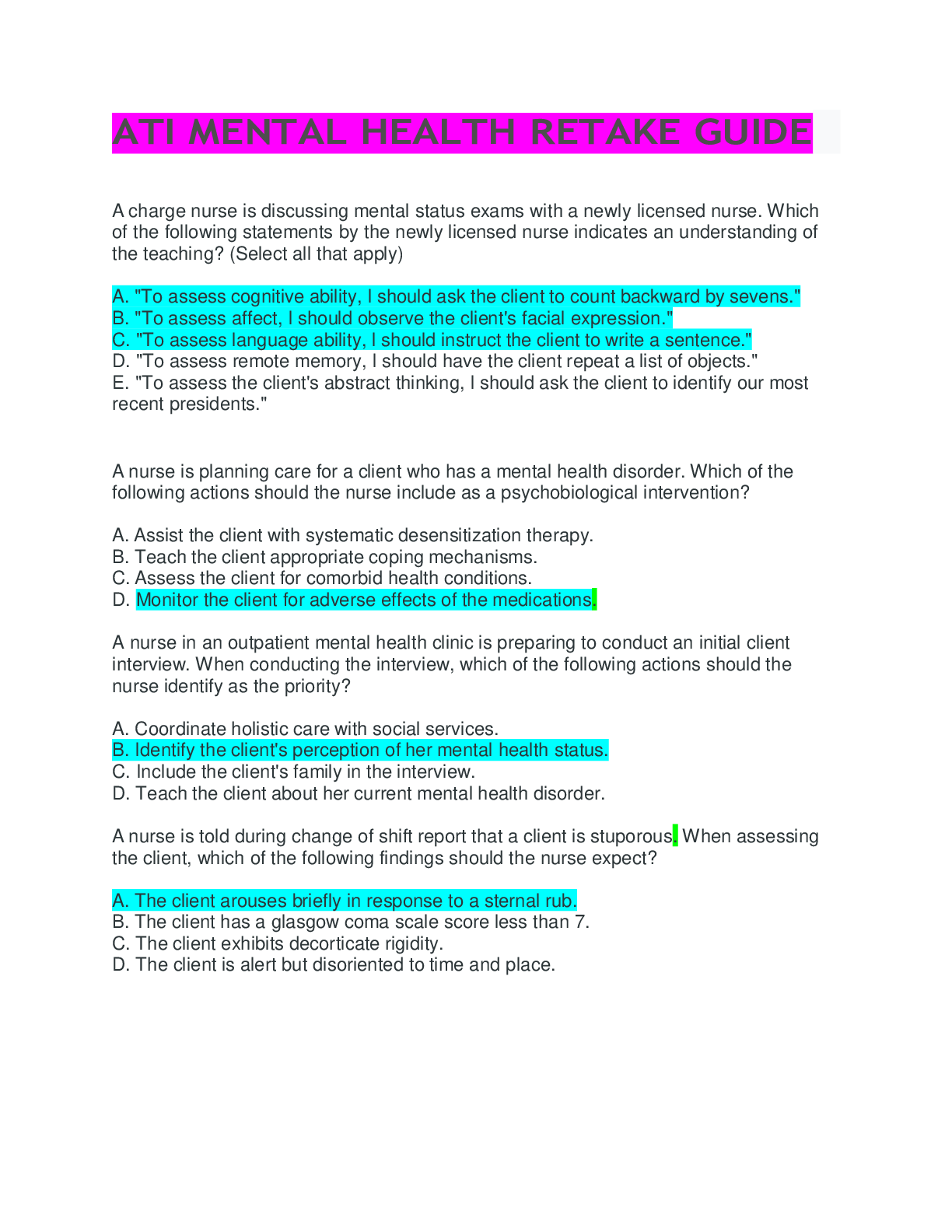
Reviews( 0 )
Recommended For You
*NURSING> EXAM PROCTORED > PHARMACOLOGY PROCTORED EXAM CLONED ASSESSMENT 1 DETAILED ANSWER KEY (All)
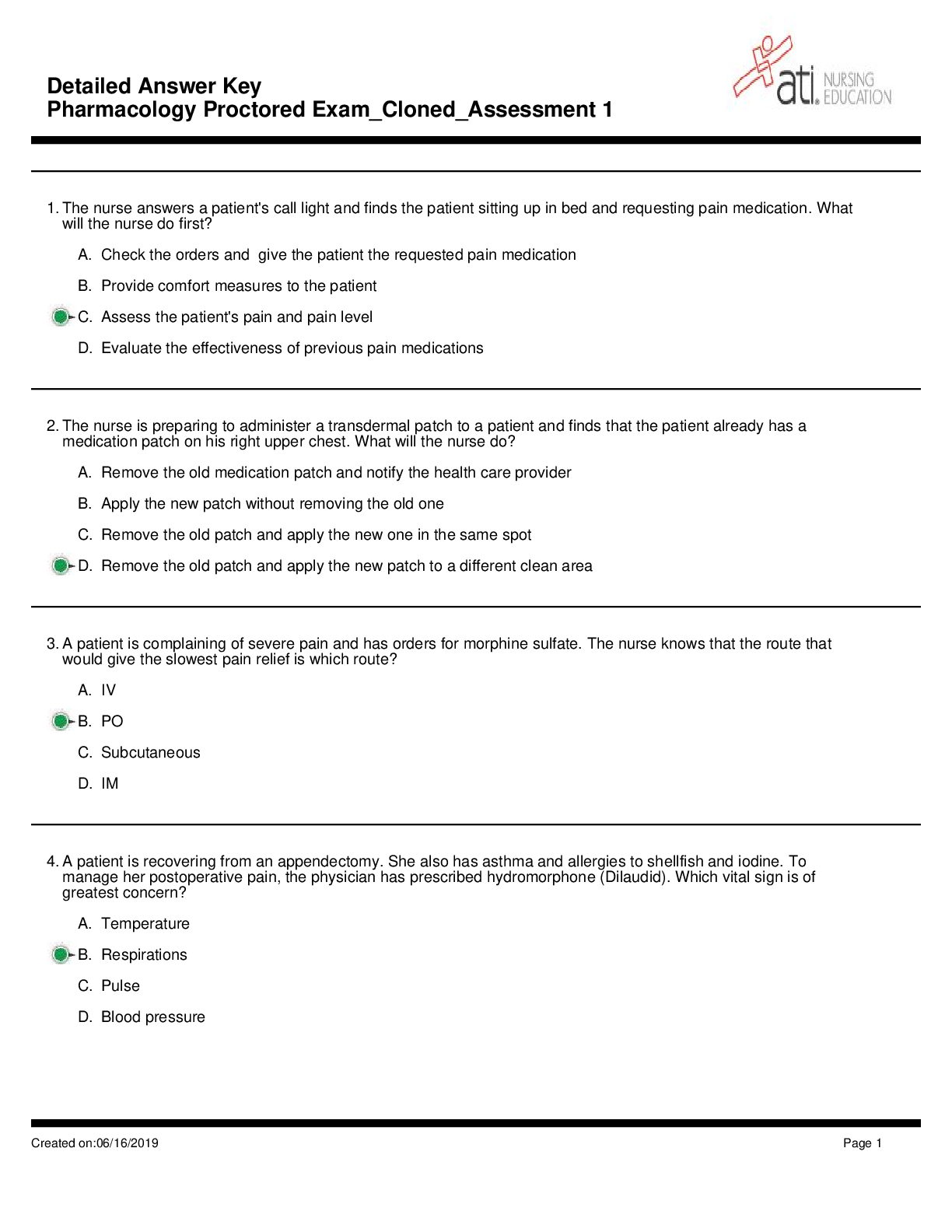
PHARMACOLOGY PROCTORED EXAM CLONED ASSESSMENT 1 DETAILED ANSWER KEY
1. The nurse answers a patient's call light and finds the patient sitting up in bed and requesting pain medication. What will the nurse do first? 2. The nurse is preparing to administer a transdermal...
By destinyd , Uploaded: May 18, 2021
$11
*NURSING> EXAM PROCTORED > ATI Pharmacology Proctored 2021 Review. (All)
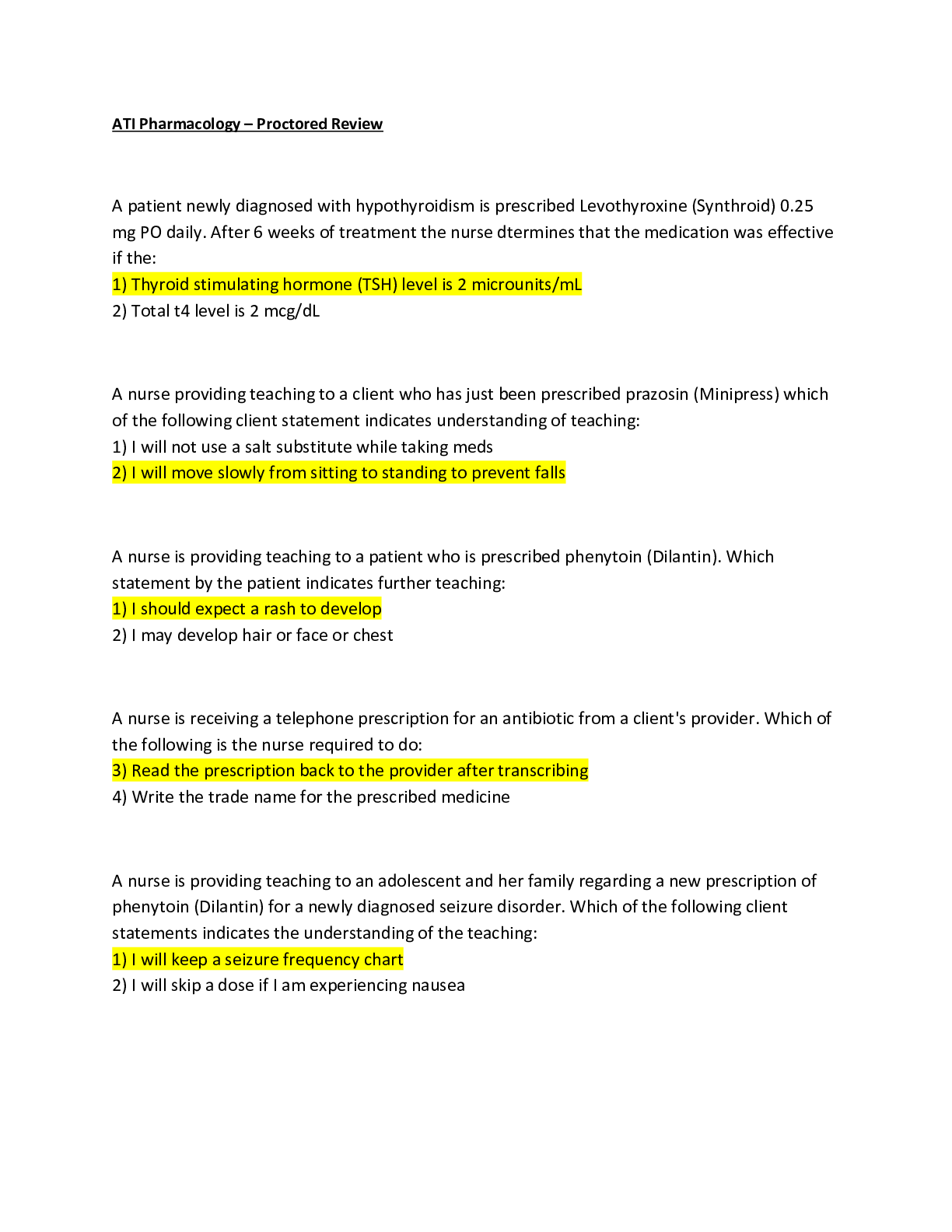
ATI Pharmacology Proctored 2021 Review.
ATI Pharmacology Proctored 2021 Review.
By Hannington , Uploaded: May 14, 2021
$11
*NURSING> EXAM PROCTORED > ATI PEDIATRIC Proctored Exam Complete Questions & Answers (All)
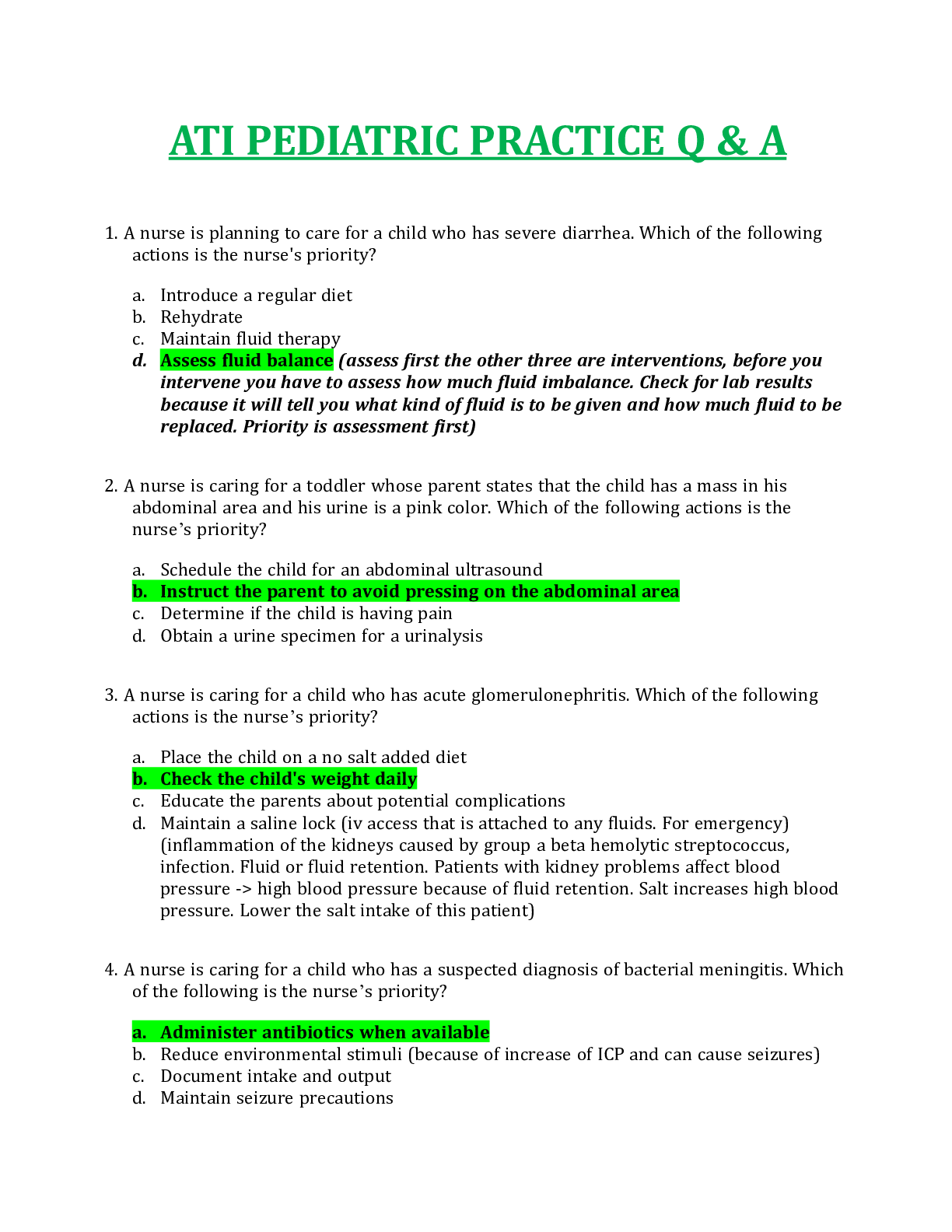
ATI PEDIATRIC Proctored Exam Complete Questions & Answers
ATI PEDIATRIC Proctored Exam Complete Questions & Answers [275 Q & A] ATI PEDIATRIC PRACTICE Q & A 1. A nurse is planning to care for a child who has severe diarrhea. Which of the following...
By quiz_bit , Uploaded: Jul 28, 2021
$10
*NURSING> EXAM PROCTORED > Fundamentals ATI Proctored Exam 2019 ATI Proctored Exam 2019_Graded A+ (All)
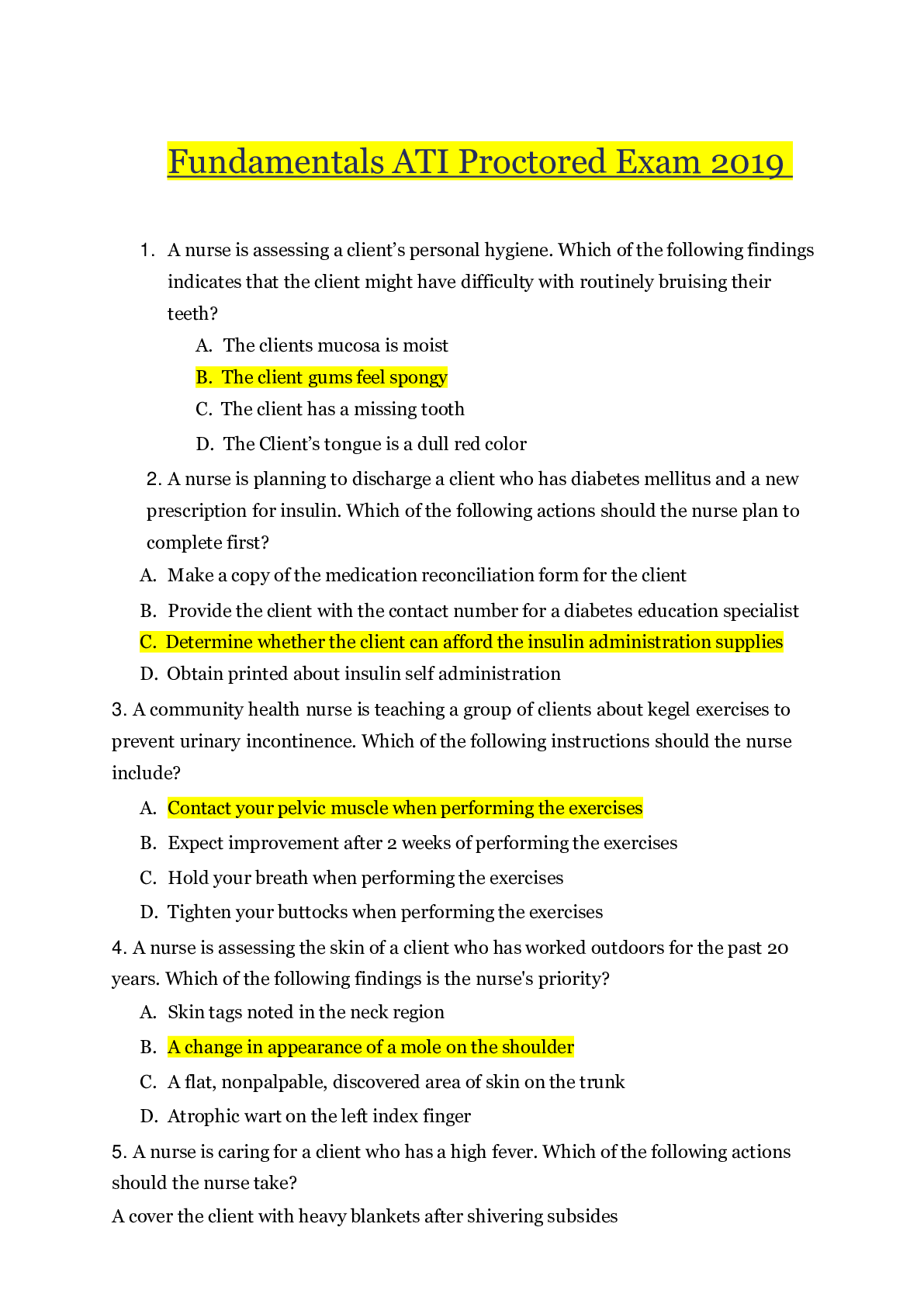
Fundamentals ATI Proctored Exam 2019 ATI Proctored Exam 2019_Graded A+
Fundamentals ATI Proctored Exam 2019 (UPDATED 2022) 1. A nurse is assessing a client’s personal hygiene. Which of the following findings indicates that the client might have difficulty with rou...
By Martin Freeman , Uploaded: Mar 02, 2021
$13
*NURSING> EXAM PROCTORED > ATI Comprehensive predictor retake 2019. complete solutions (All)
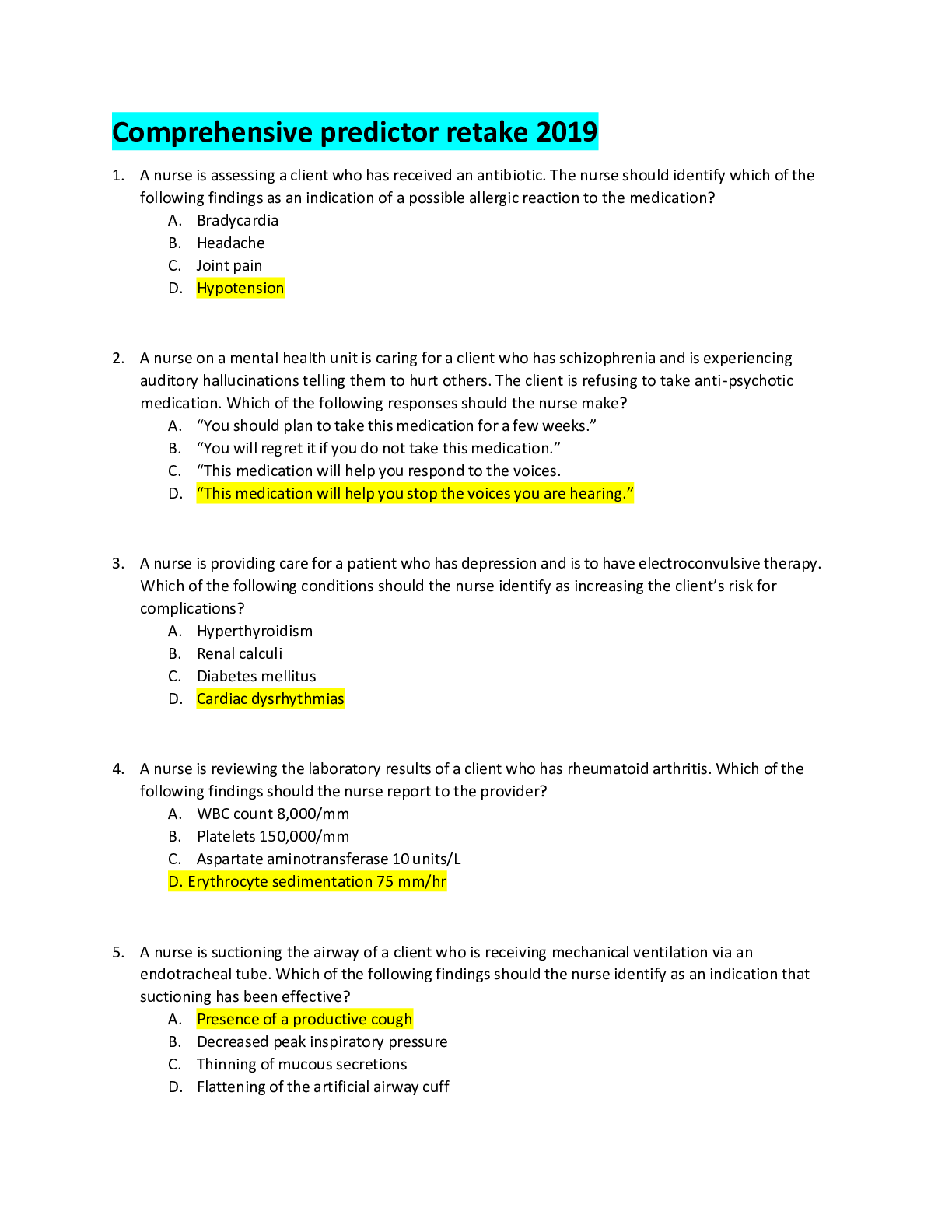
ATI Comprehensive predictor retake 2019. complete solutions
Comprehensive predictor retake 2019 1. A nurse is assessing a client who has received an antibiotic. The nurse should identify which of the following findings as an indication of a possible allergic...
By Expert#1 , Uploaded: May 06, 2021
$13
*NURSING> EXAM PROCTORED > ATI RN COMPREHENSIVE PREDICTOR FINAL EXAM QUESTION AND ANSWERS,100% CORRECT (All)
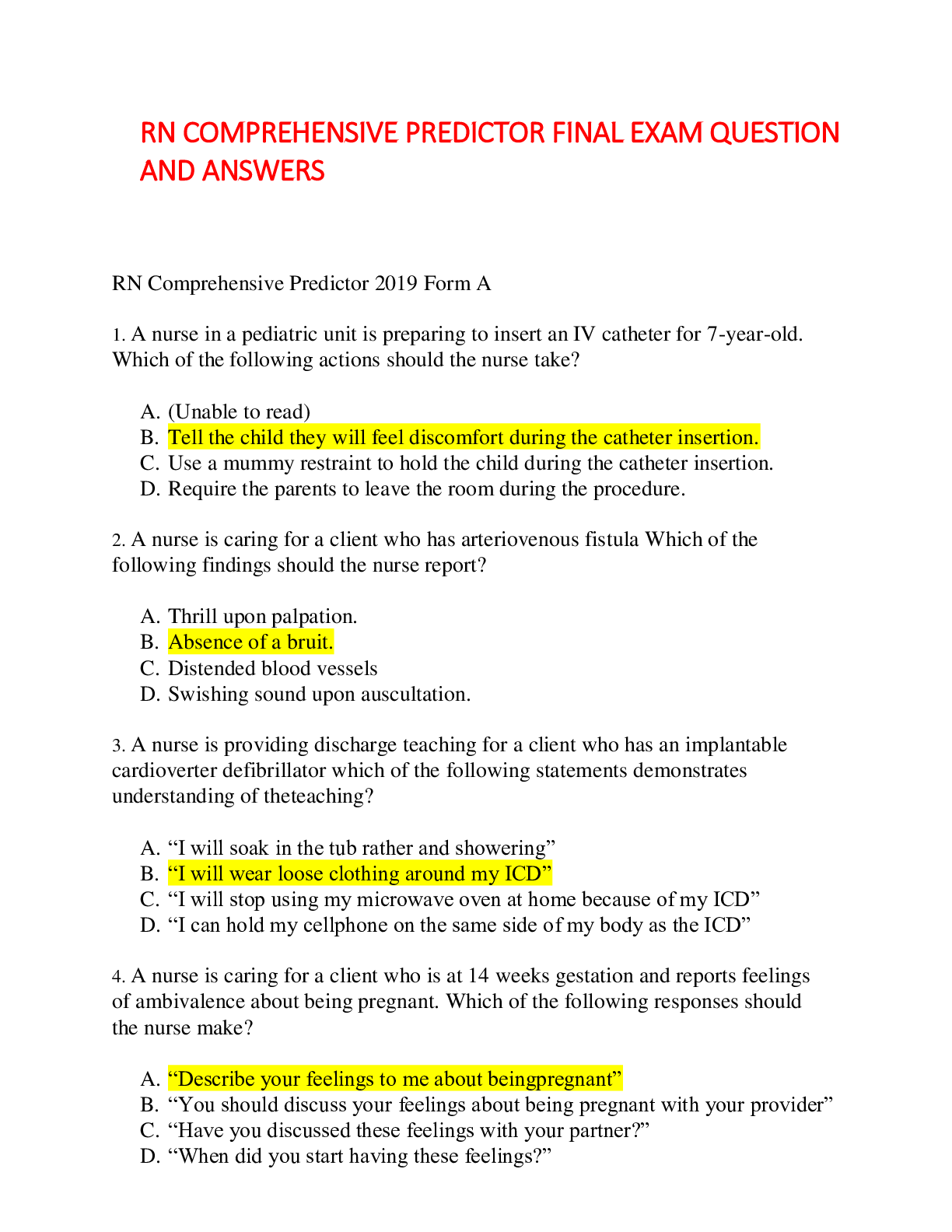
ATI RN COMPREHENSIVE PREDICTOR FINAL EXAM QUESTION AND ANSWERS,100% CORRECT
RN COMPREHENSIVE PREDICTOR FINAL EXAM QUESTION AND ANSWERS RN Comprehensive Predictor 2019 Form A 1. A nurse in a pediatric unit is preparing to insert an IV catheter for 7-year-old. Which of...
By securegrades , Uploaded: Mar 01, 2021
$14
Pharmacology> EXAM PROCTORED > ATI Pharmacology Proctored Exam Assessment 1Complete solutions. (All)
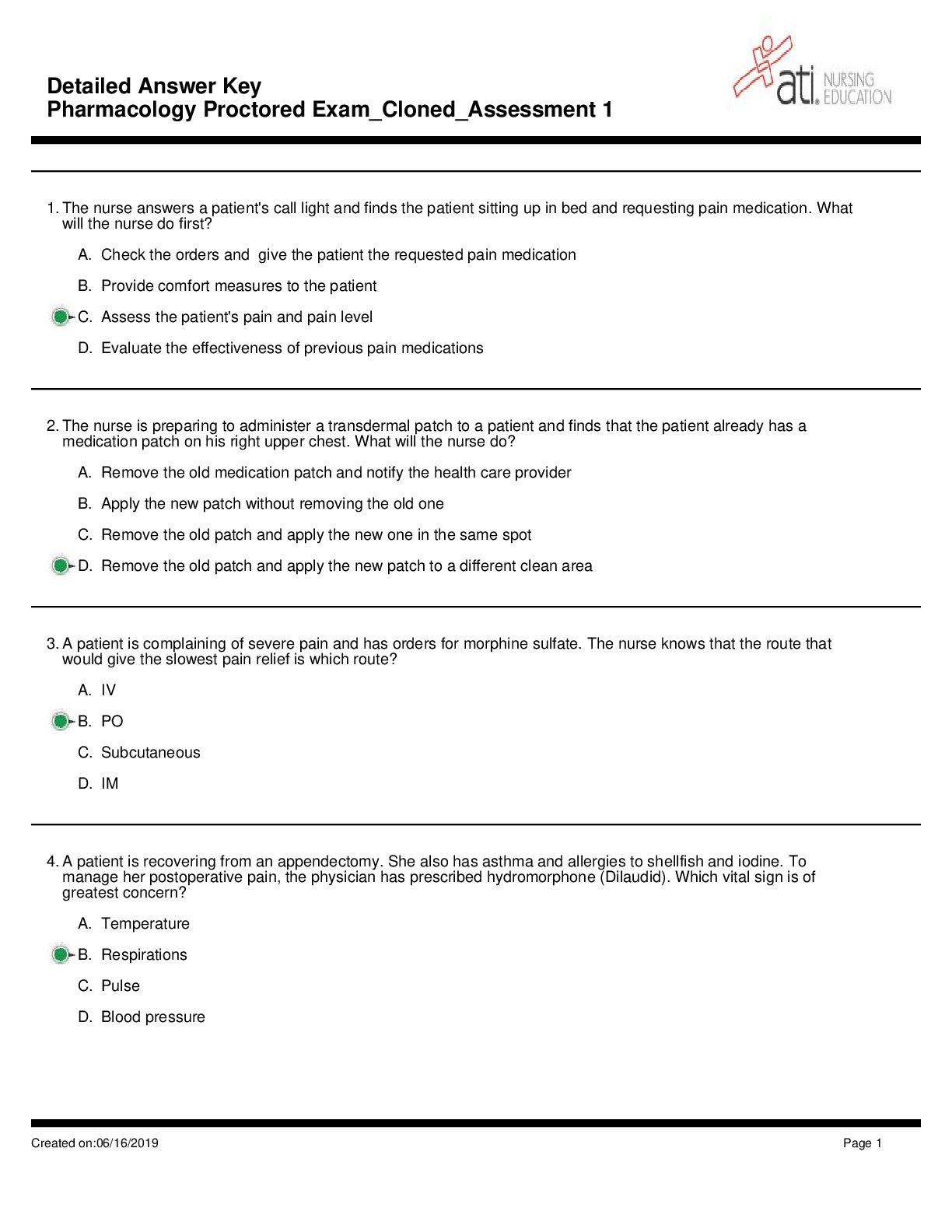
ATI Pharmacology Proctored Exam Assessment 1Complete solutions.
The nurse answers a patient's call light and finds the patient sitting up in bed and requesting pain medication. What will the nurse do first? A. Check the orders and give the patient the requested...
By Academia1434 , Uploaded: Mar 10, 2021
$14
*NURSING> EXAM PROCTORED > RN37 ATI PROCTOR Study Guide (All)
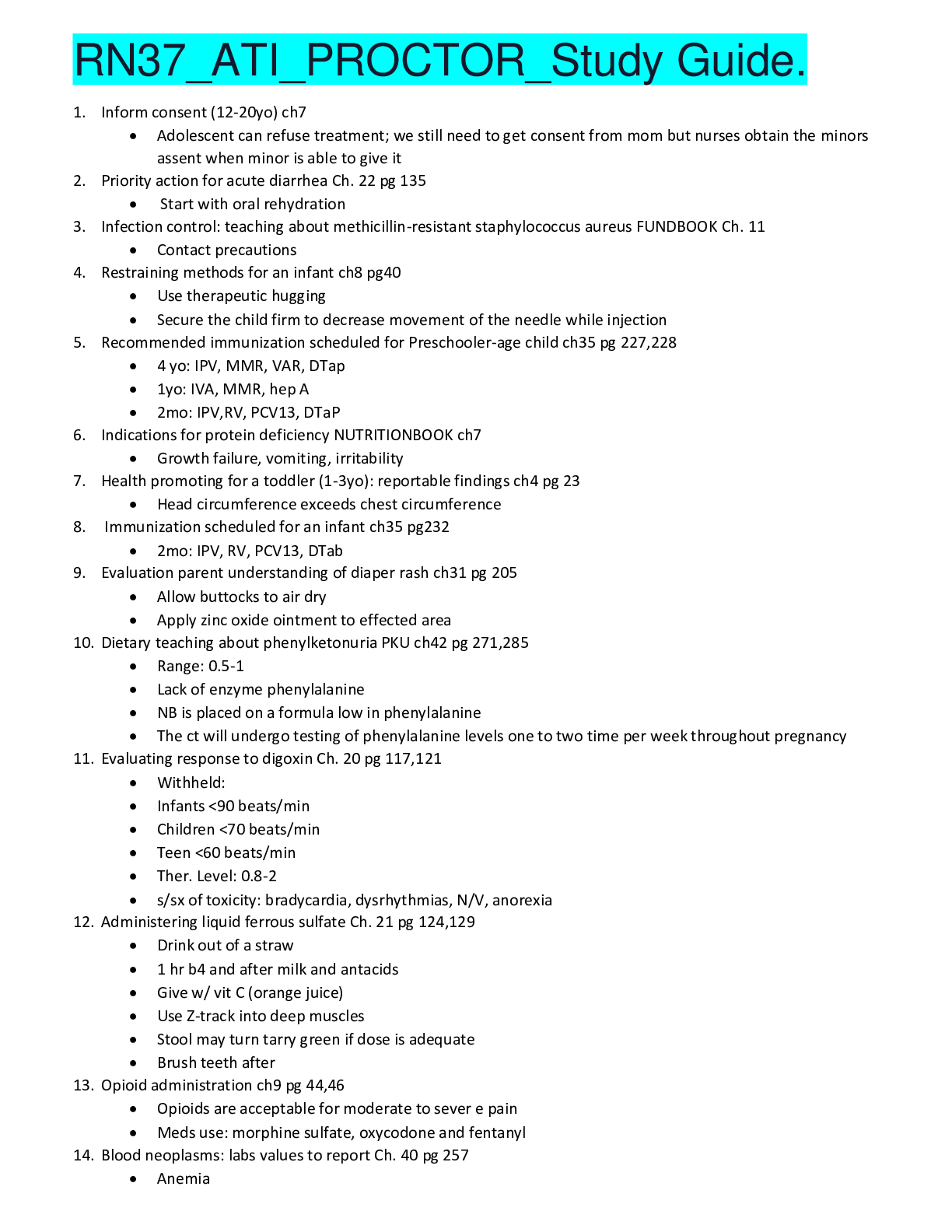
RN37 ATI PROCTOR Study Guide
RN37_ATI_PROCTOR_Study Guide. 1. Inform consent (12-20yo) ch7 • Adolescent can refuse treatment; we still need to get consent from mom but nurses obtain the minors assent when minor is able to give...
By Expert1 , Uploaded: Sep 02, 2020
$11
*NURSING> EXAM PROCTORED > ATI Med-Surg Proctored Exam (All)
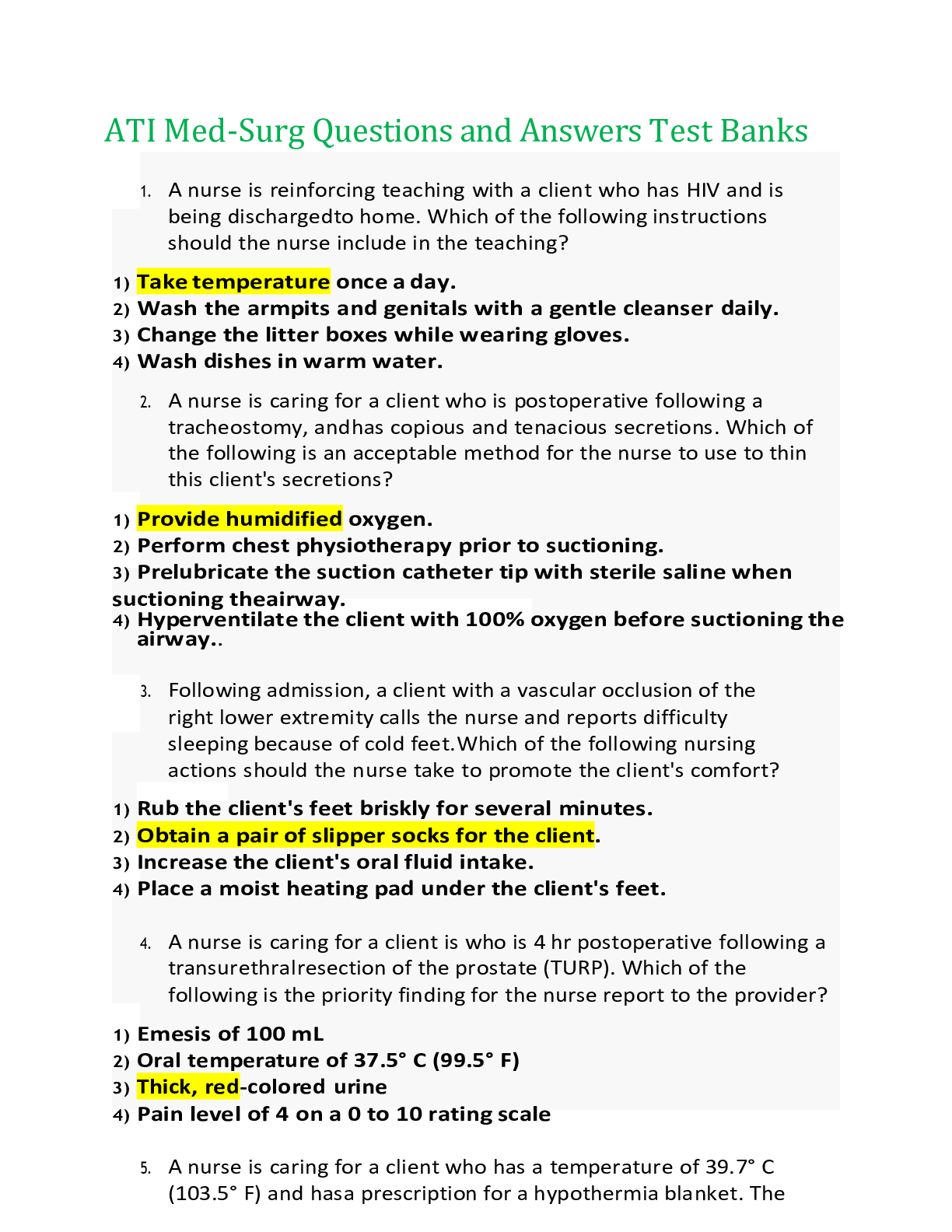
ATI Med-Surg Proctored Exam
1. A nurse is reinforcing teaching with a client who has HIV and is being discharged to home. Which of the following instructions should the nurse include in the teaching? 1) Take temperature once a...
By GradeProfessor , Uploaded: Mar 05, 2021
$9
*NURSING> EXAM PROCTORED > ATI Leadership Proctored Complete questions and answers with all all questions correct A+ grade (All)
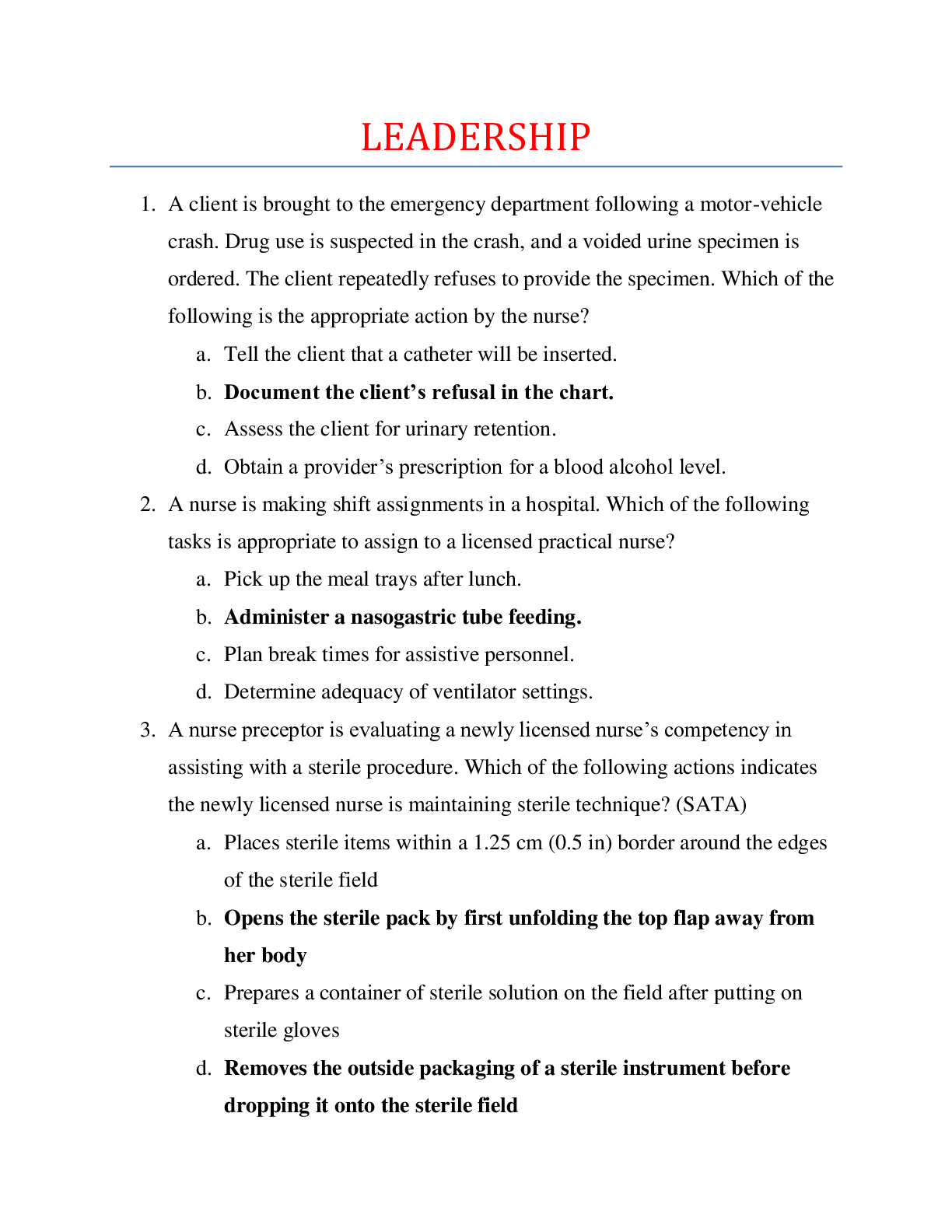
ATI Leadership Proctored Complete questions and answers with all all questions correct A+ grade
LEADERSHIP 1. A client is brought to the emergency department following a motor-vehicle crash. Drug use is suspected in the crash, and a voided urine specimen is ordered. The client repeatedly refus...
By montanagreys , Uploaded: Mar 19, 2021
$11
Document information
Connected school, study & course
About the document
Uploaded On
May 18, 2021
Number of pages
34
Written in
Additional information
This document has been written for:
Uploaded
May 18, 2021
Downloads
1
Views
732






